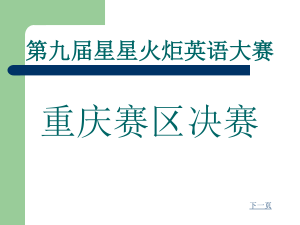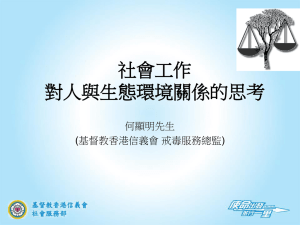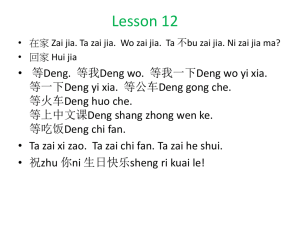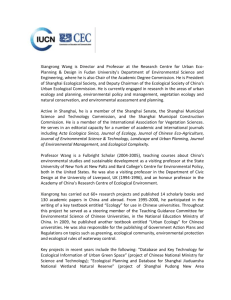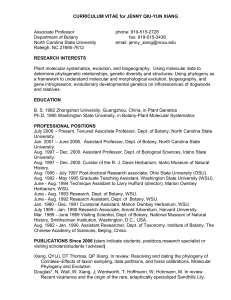web-xiang-15 - University of North Carolina at Charlotte
advertisement
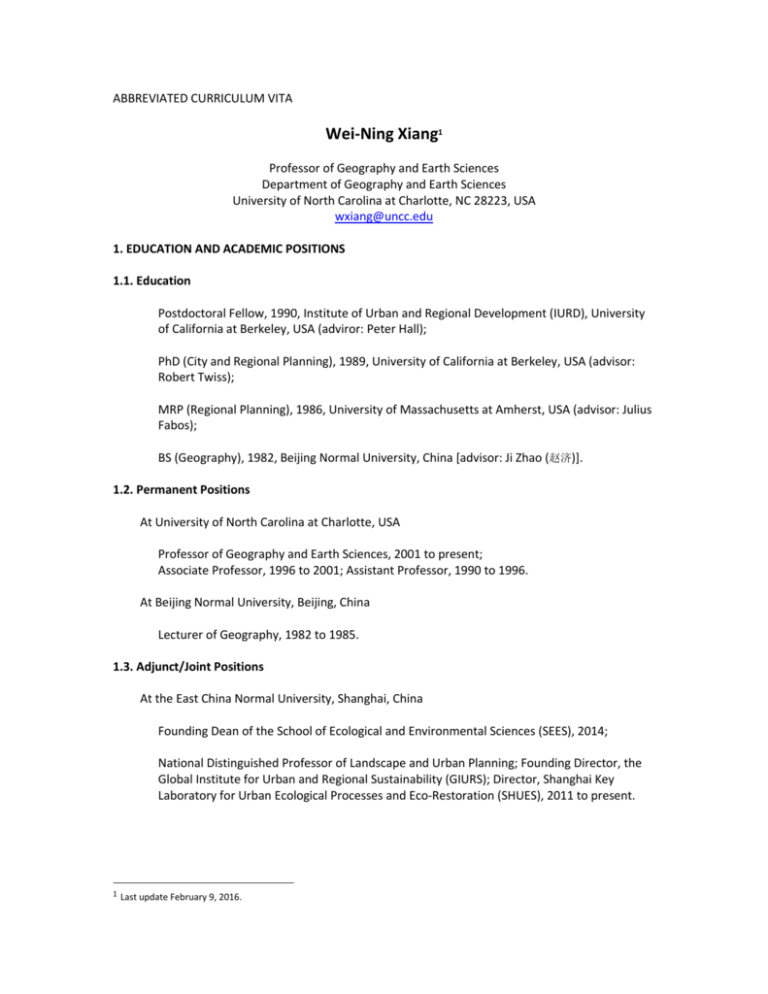
ABBREVIATED CURRICULUM VITA Wei-Ning Xiang1 Professor of Geography and Earth Sciences Department of Geography and Earth Sciences University of North Carolina at Charlotte, NC 28223, USA wxiang@uncc.edu 1. EDUCATION AND ACADEMIC POSITIONS 1.1. Education Postdoctoral Fellow, 1990, Institute of Urban and Regional Development (IURD), University of California at Berkeley, USA (adviror: Peter Hall); PhD (City and Regional Planning), 1989, University of California at Berkeley, USA (advisor: Robert Twiss); MRP (Regional Planning), 1986, University of Massachusetts at Amherst, USA (advisor: Julius Fabos); BS (Geography), 1982, Beijing Normal University, China [advisor: Ji Zhao (赵济)]. 1.2. Permanent Positions At University of North Carolina at Charlotte, USA Professor of Geography and Earth Sciences, 2001 to present; Associate Professor, 1996 to 2001; Assistant Professor, 1990 to 1996. At Beijing Normal University, Beijing, China Lecturer of Geography, 1982 to 1985. 1.3. Adjunct/Joint Positions At the East China Normal University, Shanghai, China Founding Dean of the School of Ecological and Environmental Sciences (SEES), 2014; National Distinguished Professor of Landscape and Urban Planning; Founding Director, the Global Institute for Urban and Regional Sustainability (GIURS); Director, Shanghai Key Laboratory for Urban Ecological Processes and Eco-Restoration (SHUES), 2011 to present. 1 Last update February 9, 2016. 1 1.4. Visiting Positions At the University of California, Santa Barbara, USA Visiting Professor of Geography and Research Fellow, National Center for Geographic Information and Analysis (NCGIA), 2002. 1.5. Service Positions Co-Editor-in-Chief, Landscape and Urban Planning (LAND), 2011 to present; Member, the Editorial Board, Landscape and Urban Planning (LAND), 2008 to 2011; Member, the Editorial Board, Environment and Planning B: Planning and Design, 1999 to 2005; Extermal Reviewer, the Oxford Scenarios Program (OSP), the University of Oxford, UK, 2014. 2. SELECTED PROJECTS 2.1. Recent Funded Projects as Principal Investigator Xiang, W. -N. The spatio-temporal variations of carbon sinks and sources in relation to regional socioeconomical development in the Shanghai-Yangtze-River Delta Urban Agglomeration (SHYRDUA) region (长三角地区碳源/汇时空演变及其与经济和城市化水平的协调发展研究), The National Natural Science Foundation of China (NNSF-C), January 1, 2015--December 31, 2018. Xiang, W. -N. The mechanisms of urban carbon balance: A case study in Shanghai (城市人为碳源排放过 程及其控制机制研究-以上海市为例),The Chinese Ministry of Education, January 1, 2014— December 31, 2016. Xiang, W. -N. Ecological benefit assessment of the Dong Tan Eco-City, Chongming Island, Shanghai (上 海崇明岛东滩生态城生态效益评估) ,Shanghai Municipal Council of Science and Technology, October 1, 2012—September 30, 2015. 2.2. Recent Funded Projects as Co-Principal Investigator Xiang, W.-N., Nassauer, J.I. Synthesis to link understanding, planning, and management of urban ecosystems in China. National Socio-Environmental Synthesis Center (SESYNC), USA, June 2012 to May 2014. 3. SELECTED PUBLICATIONS Single Author Xiang, W.-N. (2014). Doing real and permanent good in landscape and urban planning: Ecological wisdom for urban sustainability. Landscape and Urban Planning, 121: 65-69. Xiang, W.-N. (2013). Working wth wicked problems in socio-ecological systems: awareness, 2 acceptance, and adaptation. Landscape and Urban Planning, 110 (1): 1-4. Xiang, W. -N. (1996). GIS-Based riparian buffer analysis: Injecting geographic information into landscape planning. Landscape and Urban Planning, 34(1), pp.1-10. Lead Author Xiang, W. -N., Stuber, R.M.B., Meng, X. (2011). Meeting critical challenges and striving for urban sustainability in China. Landscape and Urban Planning, 100(4), pp.418-420. Xiang, W. -N., Clarke, K.C. (2003). The use of scenarios in land use planning. Environment and Planning B: Planning and Design, 30(6), pp.885 – 909. Xiang, W. -N. and Whitley, D.L. (1994). Weighting land suitability factors by the PLUS method. Environment and Planning B: Planning and Design, 21(3), pp.273-304. Xiang, W. -N., Gross, M., Fabos, J.G., MacDougall, E.B. (1992). A fuzzy group multicriteria decision making model and its application to land use planning. Environment and Planning B: Planning and Design, 19(1), pp.61-84. Co-Author Zhang, Y., Xia, L. Xiang, W. –N. (2014). Analyzing spatial patterns of urban carbon metabolism: A case study in Beijing, China. Landscape and Urban Planning, 130: 184-200. Wu, J.G., Xiang, W.-N., Jingzhu Zhao, J.Z., (2014). Urban ecology in China: Historical developments and future directions. Landscape and Urban Planning, 125: 222-233. He, J.H., Liu, Y.L., Yu, Y., Tang, W.W., Xiang, W.-N., Liu, D.F. (2013). A counterfactual scenario simulation approach for assessing the impact of farmland preservation policies on urban sprawl and food security in a major grain-producing area of China. Applied Geography, 37: 127-138. Li , M.M, Zhang, Q., Xiang, W.-N., Fu, Q.L., Achal, V., (2013). Recent protests against paraxylene in Kunming: Re-alarming situation for Chinese government. Ecological Engineering, 60:140141. Han, J., Xiang, W.-N. (2012). Analysis of material stock accumulation in China’s infrastructure and its regional disparity. Sustainability Science, 1(1): DOI 10.1007/s11625-012-0196-y McNally, R.K., Lee, S.W., Yavagal, D., Xiang, W. -N. (2007). Learning the critical infrastructure interdependencies through an ontology-based information system. Environment and Planning B: Planning and Design, 34(6), pp.1103-1124. Diao, Y., Xiang, W. -N. (2007). How complex can a land suitability map be? International Journal of Geographic Information Science, 21(7), pp.747-755. Perkins, R.M., Xiang, W. -N. (2006). Building a geographic info-structure for sustainable development planning on a small island developing state. Landscape and Urban Planning, 78 (4), pp.353361. 3 Tolone, W.J., Wilson, D,, Raja, A., Xiang, W.N., Hao, H.L., Phelps, S., Johnson, E.W. (2004). Critical infrastructure integration modeling and simulation. Intelligence and Security Informatics, Proceedings Lecture Notes in Computer Science. 3073, pp.214-225. Conine, A., Xiang, W. -N., Young, J., Whitley, D. (2003). Planning for multi-purpose greenways in Concord, North Carolina. Landscape and Urban Planning, 68 (2-3), pp.271-287. 4. RECENT PRESENTATIONS 4.1. Recent Keynote Speeches Xiang, W. –N. (2014). What do we need, but have yet to, do? Making scientific knowledge actionable to landscape planners. The Global Land Project Conference, Taipei, Taiwan, September 25th, 2014. Xiang, W. –N. (2013a). The purpose of scientific modeling is insight, not numbers. The International Workshop on Ecologolical Modeling for Low-Carbon Cities and the International Society of Ecological Modeling—Pacific Annual Meeting, Beijing, China, March 20th, 2013. Xiang, W. –N. (2013b). It is nice to be green, but... The Macau Inernational Co-Operation Forum and Exhibition and the China-U.S.Eco-Partnership (Wetland Research) Annual Conference, Macau, China, March 23rd, 2013. Xiang, W. –N. (2013c). With black swans and wicked problems we live and plan. The 2013 Fabos Conference on Greenway and Landscape Planning: Pathways to Sustainability, Amherst, Massachusetts, April 13th, 2013. Xiang, W. –N. (2013d). Moving forward for urban sustainability, looking backward for enlightenment: What would Li Bing and Ian McHarg do in the 21st century New York City? The 1st World Congress of the Society of Urban Ecology (SURE), Berlin, Germany, July 27, 2013. Xiang, W. –N. (2013e). Making scientific knowledge actionable for planners. RegioResources 21 conference, Catania, Italy, September 19th,2013. 4.2. Invited Presentations Xiang, W. –N. (2014a). A renaissance of ecological wisdom? Why now? The School of Sustainability, Arizona State University, Tempe, Arizona, USA, November 6, 2014. Xiang, W. –N. (2014b). Working with wicked problems in socio-ecological systems: The blind men and a hippopotamus. The Complex Adaptive Systems Initiative (CAS@ASU), Arizona State University, Tempe, Arizona, USA, November 6, 2014. Xiang, W. –N. (2014c). A renaissance of ecological wisdom? Why? Why now? The Faculty of Ecology, The People’s Friendship University of Russia, Moscow, Russia, December 22, 2014. Xiang, W. –N. (2014d). Working with wicked problems in socio‐ecological systems: The blind men and a hippopotamus. The Faculty of Ecology, The People’s Friendship University of Russia, Moscow, Russia, December 23, 2014. 4 Xiang, W. –N. (2012). Doing urban sustainability research in a sustainable way in the Shanghai-Yangzi River Delta Urban Agglomeration (SHYRDUA) Region, China. The Stockholm Environment Institute (SEI) and Stockholm Resilience Center (SRC), Stockholm, Sweden, May 7th, 2012. 5. SYMPOSIA AND WORKSHOPS Xiang, W. -N. (2014a). The international symposium on ecological wisdom for urban sustainability, Chongqing, China, October 17-18, 2014. An international symposium team-organized by the Faculty of Architecture and Urban Planning at Chongqing University and me as the co-editorin-chief of Landscape and Urban Planning and the director of The Global Institute for Urban and Regional Sustainability (GIURS), Shanghai Key Lab for Urban Ecological Processes and Eco-Restoration (SHUES), The East China Normal University (ECNU), Shanghai 200241, China (300 people attending). Xiang, W. -N. (2014b). The young scholars symposium on ecological wisdom for urban sustainability, Chongqing, China, October 17, 2014. An international symposium team-organized by the Faculty of Architecture and Urban Planning at Chongqing University and me as the co-editorin-chief of Landscape and Urban Planning and the director of The Global Institute for Urban and Regional Sustainability (GIURS), Shanghai Key Lab for Urban Ecological Processes and Eco-Restoration (SHUES), The East China Normal University (ECNU), Shanghai 200241, China (100 people attending). Xiang, W. -N. (2014c). A Workshop on ecological wisdom, Chongqing, China, October 19-20, 2014. An invitation only international workshop organized by me as the co-editor-in-chief of Landscape and urban Planning and the director of The Global Institute for Urban and Regional Sustainability (GIURS), Shanghai Key Lab for Urban Ecological Processes and EcoRestoration (SHUES), The East China Normal University (ECNU), Shanghai 200241, China (20 people attending). The workshop followed the International Symposium on Ecological Wisdom for Urban Sustainability (October 17-18, 2014). A special issue in LAND will be published in 2014 as an outcome of the workshop. Xiang, W. -N. (2014d). A writing workshop for young scholars. Chongqing, China, October 18, 2014. An international workshop organized by me as the co-editor-in-chief of Landscape and urban Planning and the director of The Global Institute for Urban and Regional Sustainability (GIURS), Shanghai Key Lab for Urban Ecological Processes and Eco-Restoration (SHUES), The East China Normal University (ECNU), Shanghai 200241, China (150 people attending). The workshop was piggybacking with the International Symposium on Ecological Wisdom for Urban Sustainability (October 17-18, 2014). Xiang, W. -N. (2013). LAND 2013: Working with wicked problems in socio-ecological systems: Theory and practice. Berkeley, California, USA, October 27, 2013. An international workshop organized by me as the co-editor-in-chief of Landscape and Urban Planning (LAND) and the director of the Global Institute for Urban and Regional Sustainability (SIURS) at the East China Normal University, Shanghai, China (40 people attending). A special issue in LAND will be published in 2015 as an outcome of the workshop. Xiang, W. -N., Wolch, J. (2013). Wicked problems in socio-ecological systems. Berkeley, California, USA, October 26, 2013. An international symposium organized by Dean Wolch of the College of Environmental Design (CED) at UC Berkeley and me as the director of the Global Institute 5 for Urban and Regional Sustainability (SIURS) at the East China Normal University, Shanghai, China (100 people attending). Xiang, W. -N. (2012). Frontiers in urban ecological research and planning: Linking ideas from the East and West, Shanghai, China, October 25—27, 2012. An international symposium organized by me as the director of the Global Institute for Urban and Regional Sustainability (SIURS), Shanghai Key Lab for Urban Ecological Processes and Eco-Restoration (SHUES), the East China Normal University (ECNU), Shanghai 200241, China (400 people attending). A special issue in LAND was published in 2014 (Vol.25) as an outcome of the workshop. 6. COURSES TAUGHT Sustainability science Resilience thinking in socio-ecological systems Multi-attribute assessment and evaluation in geography and planning Advanced seminar on spatial modeling Introduction to geographic information systems Advanced geographic information systems Advanced seminar on spatial decision support systems GIS applications in landscape and landuse planning
